- Home
- Anthony Trollope
The Fixed Period
The Fixed Period Read online
E-text prepared by Joseph E. Loewenstein, M.D., and Delphine Lettau
THE FIXED PERIOD
by
ANTHONY TROLLOPE
First published anonymously in _Blackwood's Magazine_ in 1882.
CONTENTS
VOLUME I.
I. INTRODUCTION.
II. GABRIEL CRASWELLER.
III. THE FIRST BREAK-DOWN.
IV. JACK NEVERBEND.
V. THE CRICKET-MATCH.
VI. THE COLLEGE.
VOLUME II.
VII. COLUMBUS AND GALILEO.
VIII. THE "JOHN BRIGHT."
IX. THE NEW GOVERNOR.
X. THE TOWN-HALL.
XI. FAREWELL!
XII. OUR VOYAGE TO ENGLAND.
VOLUME I.
CHAPTER I.
INTRODUCTION.
It may be doubted whether a brighter, more prosperous, and speciallya more orderly colony than Britannula was ever settled by Britishcolonists. But it had its period of separation from the mothercountry, though never of rebellion,--like its elder sister NewZealand. Indeed, in that respect it simply followed the lead givenher by the Australias, which, when they set up for themselves, did sowith the full co-operation of England. There was, no doubt, a specialcause with us which did not exist in Australia, and which was only,in part, understood by the British Government when we Britannulistswere allowed to stand by ourselves. The great doctrine of a "FixedPeriod" was received by them at first with ridicule, and thenwith dismay; but it was undoubtedly the strong faith which we ofBritannula had in that doctrine which induced our separation. Nothingcould have been more successful than our efforts to live alone duringthe thirty years that we remained our own masters. We repudiated nodebt,--as have done some of our neighbours; and no attempts havebeen made towards communism,--as has been the case with others.We have been laborious, contented, and prosperous; and if we havebeen reabsorbed by the mother country, in accordance with what Icannot but call the pusillanimous conduct of certain of our elderBritannulists, it has not been from any failure on the part of theisland, but from the opposition with which the Fixed Period has beenregarded.
I think I must begin my story by explaining in moderate language afew of the manifest advantages which would attend the adoption of theFixed Period in all countries. As far as the law went it was adoptedin Britannula. Its adoption was the first thing discussed by ouryoung Assembly, when we found ourselves alone; and though there weredisputes on the subject, in none of them was opposition made to thesystem. I myself, at the age of thirty, had been elected Speaker ofthat Parliament. But I was, nevertheless, able to discuss the meritsof the bills in committee, and I did so with some enthusiasm. Thirtyyears have passed since, and my "period" is drawing nigh. But I amstill as energetic as ever, and as assured that the doctrine willultimately prevail over the face of the civilised world, though Iwill acknowledge that men are not as yet ripe for it.
The Fixed Period has been so far discussed as to make it almostunnecessary for me to explain its tenets, though its advantages mayrequire a few words of argument in a world that is at present dead toits charms. It consists altogether of the abolition of the miseries,weakness, and _faineant_ imbecility of old age, by the prearrangedceasing to live of those who would otherwise become old. Need Iexplain to the inhabitants of England, for whom I chiefly write, howextreme are those sufferings, and how great the costliness of thatold age which is unable in any degree to supply its own wants? Suchold age should not, we Britannulists maintain, be allowed to be. Thisshould be prevented, in the interests both of the young and of thosewho do become old when obliged to linger on after their "period" ofwork is over. Two mistakes have been made by mankind in reference totheir own race,--first, in allowing the world to be burdened with thecontinued maintenance of those whose cares should have been made tocease, and whose troubles should be at an end. Does not the Psalmistsay the same?--"If by reason of strength they be fourscore years, yetis their strength labour and sorrow." And the second, in requiringthose who remain to live a useless and painful life. Both theseerrors have come from an ill-judged and a thoughtless tenderness,--atenderness to the young in not calling upon them to provide forthe decent and comfortable departure of their progenitors; and atenderness to the old lest the man, when uninstructed and unconsciousof good and evil, should be unwilling to leave the world for whichhe is not fitted. But such tenderness is no better than unpardonableweakness. Statistics have told us that the sufficient sustenance ofan old man is more costly than the feeding of a young one,--as isalso the care, nourishment, and education of the as yet unprofitablechild. Statistics also have told us that the unprofitable young andthe no less unprofitable old form a third of the population. Let thereader think of the burden with which the labour of the world is thussaddled. To these are to be added all who, because of illness cannotwork, and because of idleness will not. How are a people to thrivewhen so weighted? And for what good? As for the children, they areclearly necessary. They have to be nourished in order that they maydo good work as their time shall come. But for whose good are the oldand effete to be maintained amid all these troubles and miseries? Hadthere been any one in our Parliament capable of showing that theycould reasonably desire it, the bill would not have been passed.Though to me the politico-economical view of the subject was alwaysvery strong, the relief to be brought to the aged was the oneargument to which no reply could be given.
It was put forward by some who opposed the movement, that the oldthemselves would not like it. I never felt sure of that, nor do Inow. When the colony had become used to the Fixed Period system,the old would become accustomed as well as the young. It is to beunderstood that a euthanasia was to be prepared for them;--and howmany, as men now are, does a euthanasia await? And they would departwith the full respect of all their fellow-citizens. To how many doesthat lot now fall? During the last years of their lives they were tobe saved from any of the horrors of poverty. How many now lack thecomforts they cannot earn for themselves? And to them there would beno degraded feeling that they were the recipients of charity. Theywould be prepared for their departure, for the benefit of theircountry, surrounded by all the comforts to which, at their time oflife, they would be susceptible, in a college maintained at thepublic expense; and each, as he drew nearer to the happy day, wouldbe treated with still increasing honour. I myself had gone mostclosely into the question of expense, and had found that by the useof machinery the college could almost be made self-supporting. Butwe should save on an average L50 for each man and woman who haddeparted. When our population should have become a million, presumingthat one only in fifty would have reached the desired age, the sumactually saved to the colony would amount to L1,000,000 a-year. Itwould keep us out of debt, make for us our railways, render all ourrivers navigable, construct our bridges, and leave us shortly therichest people on God's earth! And this would be effected by ameasure doing more good to the aged than to any other class of thecommunity!
Many arguments were used against us, but were vain and futile intheir conception. In it religion was brought to bear; and in talkingof this the terrible word "murder" was brought into common use. Iremember startling the House by forbidding any member to use a phraseso revolting to the majesty of the people. Murder! Did any one whoattempted to deter us by the use of foul language, bethink himselfthat murder, to be murder, must be opposed to the law? This thing wasto be done by the law. There can be no other murder. If a murdererbe hanged,--in England, I mean, for in Britannula we have no capitalpunishment,--is that murder? It is not so, only because the lawenacts it. I and a few others did succeed at last in stopping the useof that word. Then they talked to us of Methuselah, and endeavouredt
o draw an argument from the age of the patriarchs. I asked them incommittee whether they were prepared to prove that the 969 years, asspoken of in Genesis, were the same measure of time as 969 years now,and told them that if the sanitary arrangements of the world wouldagain permit men to live as long as the patriarchs, we would gladlychange the Fixed Period.
In fact, there was not a word to be said against us except thatwhich referred to the feelings of the young and old. Feelings arechangeable, I told them at that great and glorious meeting whichwe had at Gladstonopolis, and though naturally governed only byinstinct, would be taught at last to comply with reason. I had latelyread how feelings had been allowed in England to stand in the way ofthe great work of cremation. A son will not like, you say, to leadhis father into the college. But ought he not to like to do so? andif so, will not reason teach him to like to do what he ought? I canconceive with rapture the pride, the honour, the affection withwhich, when the Fixed Period had come, I could have led my fatherinto the college, there to enjoy for twelve months that preparationfor euthanasia which no cares for this world would be allowed todisturb. All the existing ideas of the grave would be absent. Therewould be no further struggles to prolong the time of misery whichnature had herself produced. That temptation to the young to begrudgeto the old the costly comforts which they could not earn would be nolonger fostered. It would be a pride for the young man to feel thathis parent's name had been enrolled to all coming time in the brightbooks of the college which was to be established for the FixedPeriod. I have a son of my own, and I have carefully educated him tolook forward to the day in which he shall deposit me there as theproudest of his life. Circumstances, as I shall relate in this story,have somewhat interfered with him; but he will, I trust, yet comeback to the right way of thinking. That I shall never spend that lasthappy year within the walls of the college, is to me, from a selfishpoint of view, the saddest part of England's reassuming our island asa colony.
My readers will perceive that I am an enthusiast. But there arereforms so great that a man cannot but be enthusiastic when he hasreceived into his very soul the truth of any human improvement. Alasme! I shall never live to see carried out the glory of this measureto which I have devoted the best years of my existence. The college,which has been built under my auspices as a preparation for the happydeparture, is to be made a Chamber of Commerce. Those aged men whowere awaiting, as I verily believe, in impatience the coming day oftheir perfected dignity, have been turned loose in the world, andallowed to grovel again with mundane thoughts amidst the idleness ofyears that are useless. Our bridges, our railways, our Government arenot provided for. Our young men are again becoming torpid beneaththe weight imposed upon them. I was, in truth, wrong to think thatso great a reform could be brought to perfection within the days ofthe first reformers. A divine idea has to be made common to men'sminds by frequent ventilation before it will be seen to be fitfor humanity. Did not the first Christians all suffer affliction,poverty, and martyrdom? How many centuries has it taken in thehistory of the world to induce it to denounce the not yet abolishedtheory of slavery? A throne, a lord, and a bishop still remain toencumber the earth! What right had I, then, as the first of theFixed-Periodists, to hope that I might live to see my scheme carriedout, or that I might be allowed to depart as among the first gloriousrecipients of its advantages?
It would appear absurd to say that had there been such a law inforce in England, England would not have prevented its adoption inBritannula. That is a matter of course. But it has been because theold men are still alive in England that the young in Britannula areto be afflicted,--the young and the old as well. The Prime Ministerin Downing Street was seventy-two when we were debarred from carryingout our project, and the Secretary for the Colonies was sixty-nine.Had they been among us, and had we been allowed to use our wisdomwithout interference from effete old age, where would they have been?I wish to speak with all respect of Sir William Gladstone. When wenamed our metropolis after him, we were aware of his good qualities.He has not the eloquence of his great-grandfather, but he is, theytell us, a safe man. As to the Minister for the Crown Colonies,--ofwhich, alas! Britannula has again become one,--I do not, I own, lookupon him as a great statesman. The present Duke of Hatfield has noneof the dash, if he has more than the prudence, of his grandfather.He was elected to the present Upper Chamber as a strong anti-ChurchLiberal, but he never has had the spirit to be a true reformer. It isnow due to the "feelings" which fill no doubt the bosoms of these twoanti-Fixed-Period seniors, that the doctrine of the Fixed Period hasfor a time been quenched in Britannula. It is sad to think that thestrength and intellect and spirit of manhood should thus be conqueredby that very imbecility which it is their desire to banish from theworld.
Two years since I had become the President of that which we gloriedto call the rising Empire of the South Pacific. And in spite of allinternal opposition, the college of the Fixed Period was alreadycompleted. I then received violent notice from the British Governmentthat Britannula had ceased to be independent, and had again beenabsorbed by the mother country among the Crown Colonies. How thatinformation was received, and with what weakness on the part of theBritannulists, I now proceed to tell.
I confess that I for one was not at first prepared to obey. We weresmall, but we were independent, and owed no more of submission toGreat Britain than we do to the Salomon Islands or to Otaheite.It was for us to make our own laws, and we had hitherto made themin conformity with the institutions, and, I must say, with theprejudices of so-called civilisation. We had now made a first attemptat progress beyond these limits, and we were immediately stopped bythe fatuous darkness of the old men whom, had Great Britain knownher own interest, she would already have silenced by a Fixed Periodlaw on her own account. No greater instance of uncalled-for tyrannyis told of in the history of the world as already written. But mybrother Britannulists did not agree with me that, in the interest ofthe coming races, it was our duty rather to die at our posts thanyield to the menaces of the Duke of Hatfield. One British gunboat,they declared, in the harbour of Gladstonopolis, would reduce us--toorder. What order? A 250-ton steam-swiveller could no doubt crushus, and bring our Fixed Period college in premature ruin about ourears. But, as was said, the captain of the gunboat would never dareto touch the wire that should commit so wide a destruction. AnEnglishman would hesitate to fire a shot that would send perhaps fivethousand of his fellow-creatures to destruction before their FixedPeriod. But even in Britannula fear still remains. It was decided, Iwill confess by the common voice of the island, that we should admitthis Governor, and swear fealty again to the British Crown. SirFerdinando Brown was allowed to land, and by the rejoicing made atthe first Government House ball, as I have already learned since Ileft the island, it appeared that the Britannulists rejoiced ratherthan otherwise at their thraldom.
Two months have passed since that time, and I, being a worn-out oldman, and fitted only for the glory of the college, have nothing leftme but to write this story, so that coming ages may see how noblewere our efforts. But in truth, the difficulties which lay in ourway were very stern. The philosophical truth on which the system isfounded was too strong, too mighty, too divine, to be adopted by manin the immediate age of its first appearance. But it has appeared;and I perhaps should be contented and gratified, during the yearswhich I am doomed to linger through impotent imbecility, to thinkthat I have been the first reformer of my time, though I shall bedoomed to perish without having enjoyed its fruits.
I must now explain before I begin my story certain details of ourplan, which created much schism among ourselves. In the first place,what should be the Fixed Period? When a party of us, three or fourhundred in number, first emigrated from New Zealand to Britannula,we were, almost all of us, young people. We would not consent tomeasures in regard to their public debt which the Houses in NewZealand threatened to take; and as this island had been discovered,and a part of it cultivated, thither we determined to go. Ourresolution was very popular, not only with certain par
ties in NewZealand, but also in the mother country. Others followed us, and wesettled ourselves with great prosperity. But we were essentiallya young community. There were not above ten among us who had thenreached any Fixed Period; and not above twenty others who could besaid to be approaching it. There never could arrive a time or apeople when, or among whom, the system could be tried with so good ahope of success. It was so long before we had been allowed to standon our bottom, that the Fixed Period became a matter of commonconversation in Britannula. There were many who looked forward toit as the creator of a new idea of wealth and comfort; and it wasin those days that the calculation was made as to the rivers andrailways. I think that in England they thought that a few, and buta few, among us were dreamers of a dream. Had they believed thatthe Fixed Period would ever have become law, they would not havepermitted us to be law-makers. I acknowledge that. But when we wereonce independent, then again to reduce us to submission by a 250-tonsteam-swiveller was an act of gross tyranny.
What should be the Fixed Period? That was the first question whichdemanded an immediate answer. Years were named absurd in theirintended leniency;--eighty and even eighty-five! Let us say ahundred, said I, aloud, turning upon them all the battery of myridicule. I suggested sixty; but the term was received with silence.I pointed out that the few old men now on the island might beexempted, and that even those above fifty-five might be allowed todrag out their existences if they were weak enough to select forthemselves so degrading a position. This latter proposition wasaccepted at once, and the exempt showed no repugnance even when itwas proved to them that they would be left alone in the community andentitled to no honour, and never allowed even to enter the pleasantgardens of the college. I think now that sixty was too early an age,and that sixty-five, to which I gracefully yielded, is the properFixed Period for the human race. Let any man look among his friendsand see whether men of sixty-five are not in the way of those who arestill aspiring to rise in the world. A judge shall be deaf on thebench when younger men below him can hear with accuracy. His voiceshall have descended to a poor treble, or his eyesight shall be dimand failing. At any rate, his limbs will have lost all that robustagility which is needed for the adequate performance of the work ofthe world. It is self-evident that at sixty-five a man has done allthat he is fit to do. He should be troubled no longer with labour,and therefore should be troubled no longer with life. "It is allvanity and vexation of spirit," such a one would say, if still brave,and still desirous of honour. "Lead me into the college, and therelet me prepare myself for that brighter life which will requireno mortal strength." My words did avail with many, and then theydemanded that seventy should be the Fixed Period.
How long we fought over this point need not now be told. But wedecided at last to divide the interval. Sixty-seven and a half wasnamed by a majority of the Assembly as the Fixed Period. Surely thecolony was determined to grow in truth old before it could go intothe college. But then there came a further dispute. On which sideof the Fixed Period should the year of grace be taken? Our debateseven on this subject were long and animated. It was said that theseclusion within the college would be tantamount to penal departure,and that the old men should thus have the last lingering drops ofbreath allowed them, without, in the world at large. It was at lastdecided that men and women should be brought into the college atsixty-seven, and that before their sixty-eighth birthday they shouldhave departed. Then the bells were rung, and the whole communityrejoiced, and banquets were eaten, and the young men and women calledeach other brother and sister, and it was felt that a great reformhad been inaugurated among us for the benefit of mankind at large.
Little was thought about it at home in England when the bill waspassed. There was, I suppose, in the estimation of Englishmen, timeenough to think about it. The idea was so strange to them that itwas considered impossible that we should carry it out. They heard ofthe bill, no doubt; but I maintain that, as we had been allowed toseparate ourselves and stand alone, it was no more their concern thanif it had been done in Arizona or Idaho, or any of those WesternStates of America which have lately formed themselves into a newunion. It was from them, no doubt, that we chiefly expected thatsympathy which, however, we did not receive. The world was clearlynot yet alive to the grand things in store for it. We received,indeed, a violent remonstrance from the old-fashioned Government atWashington; but in answer to that we stated that we were preparedto stand and fall by the new system--that we expected glory ratherthan ignominy, and to be followed by mankind rather than repudiated.We had a lengthened correspondence also with New Zealand and withAustralia; but England at first did not believe us; and when she wasgiven to understand that we were in earnest, she brought to bear uponus the one argument that could have force, and sent to our harbourher 250-ton steam-swiveller. The 250-ton swiveller, no doubt, wasunanswerable--unless we were prepared to die for our system. I wasprepared, but I could not carry the people of my country with me.
I have now given the necessary prelude to the story which I have totell. I cannot but think that, in spite of the isolated manners ofGreat Britain, readers in that country generally must have becomeacquainted with the views of the Fixed-Periodists. It cannot butbe that a scheme with such power to change,--and, I may say, toimprove,--the manners and habits of mankind, should be known in acountry in which a portion of the inhabitants do, at any rate, readand write. They boast, indeed, that not a man or a woman in theBritish Islands is now ignorant of his letters; but I am informedthat the knowledge seldom approaches to any literary taste. It may bethat a portion of the masses should have been ignorant of what wasbeing done within the empire of the South Pacific. I have thereforewritten this preliminary chapter to explain to them what was thecondition of Britannula in regard to the Fixed Period just twelvemonths before England had taken possession of us, and once moremade us her own. Sir Ferdinando Brown now rules us, I must say, notwith a rod of iron, but very much after his own good will. He makesus flowery speeches, and thinks that they will stand in lieu ofindependence. He collects his revenue, and informs us that to betaxed is the highest privilege of an ornate civilisation. He pointedto the gunboat in the bay when it came, and called it the divinedepository of beneficent power. For a time, no doubt, British"tenderness" will prevail. But I shall have wasted my thoughts, andin vain poured out my eloquence as to the Fixed Period, if, in thecourse of years, it does not again spring to the front, and proveitself to be necessary before man can accomplish all that he isdestined to achieve.

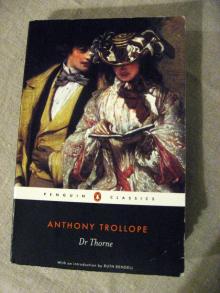 Doctor Thorne
Doctor Thorne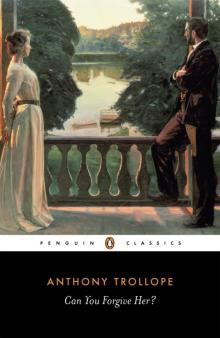 Can You Forgive Her?
Can You Forgive Her?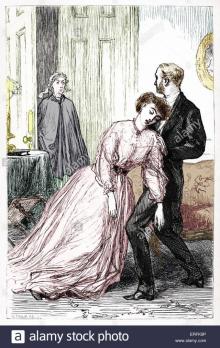 The Last Chronicle of Barset
The Last Chronicle of Barset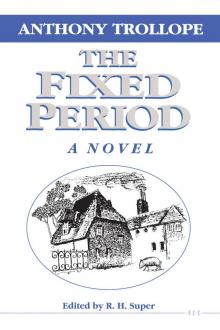 The Fixed Period
The Fixed Period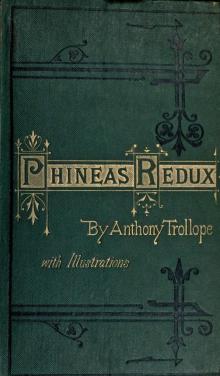 Phineas Redux
Phineas Redux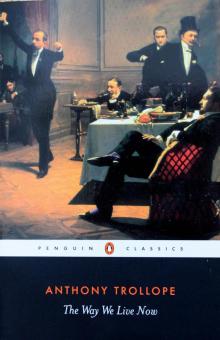 The Way We Live Now
The Way We Live Now Castle Richmond
Castle Richmond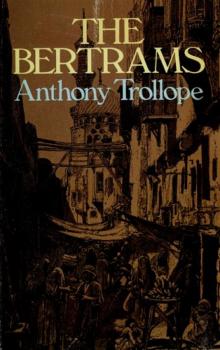 The Bertrams
The Bertrams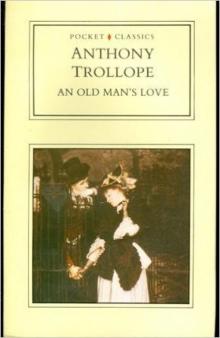 An Old Man's Love
An Old Man's Love The Belton Estate
The Belton Estate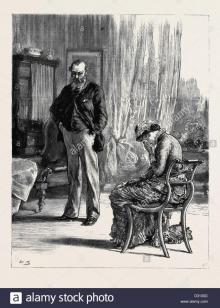 Marion Fay: A Novel
Marion Fay: A Novel The Claverings
The Claverings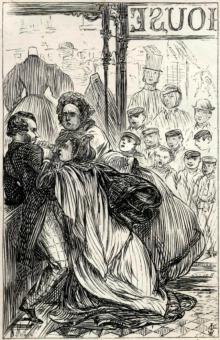 The Struggles of Brown, Jones, and Robinson
The Struggles of Brown, Jones, and Robinson Nina Balatka
Nina Balatka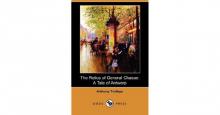 The Relics of General Chasse: A Tale of Antwerp
The Relics of General Chasse: A Tale of Antwerp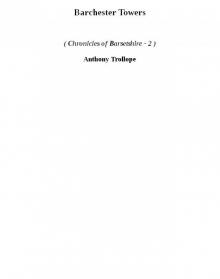 Barchester Towers cob-2
Barchester Towers cob-2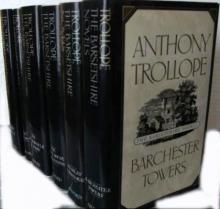 The Chronicles of Barsetshire
The Chronicles of Barsetshire The Warden cob-1
The Warden cob-1 Framley Parsonage
Framley Parsonage Christmas at Thompson Hall
Christmas at Thompson Hall The Warden
The Warden The Palliser Novels
The Palliser Novels The Small House at Allington
The Small House at Allington Barchester Towers
Barchester Towers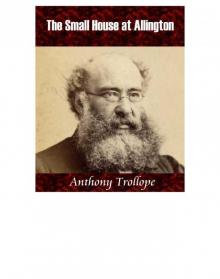 The Small House at Allington cob-5
The Small House at Allington cob-5 The Duke's Children
The Duke's Children Phineas Finn, the Irish Member
Phineas Finn, the Irish Member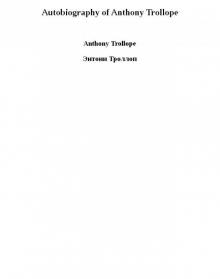 Autobiography of Anthony Trollope
Autobiography of Anthony Trollope